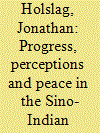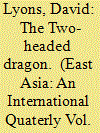| Srl | Item |
| 1 |
ID:
087754


|
|
|
|
|
| Publication |
2009.
|
| Summary/Abstract |
The Hong Kong government has been reforming its laws regarding accounting practices in recent years, to pre-empt problems similar to that of Enron. It correctly recognizes an opportunity to enhance and distinguish the financial system in Hong Kong and create a competitive advantage for Hong Kong. The sixty-five billion dollar question is: what is the right approach for accounting practice reform? One obvious approach is to model reform after the Sarbanes Oxley Act (SOX). The SOX increases personal liabilities of senior management and introduces extremely cumbersome compliance processes (s 3 (b)(ix) of Minutes of Bills Committee of Financial Reporting Council Bill. (19 July 2005)). While this approach may be the right move for the United States, because rescuing investor confidence is paramount, a similar approach may not be optimal for Hong Kong. Hong Kong relies, to a great degree, on foreign investments and a heavy-handed approach may scare investments away (Charles E. Schumer & Michael R. Bloomberg To Save New York, Learn from London, Wall Street Journal 1 Nov 2006). This paper, argues that failure of independent auditors was mainly caused by bad incentives. In particular, auditors were hired by and responsible to the management of companies. Thus, there is no surprise that auditors were less diligent in finding problems caused by management. Furthermore, proposing of an alternate to the SOA's approach. Specifically, a new legal approach should be enforced that allows shareholders to sue auditors when failure to uncover accounting issues causes loss of shareholders' values.
|
|
|
|
|
|
|
|
|
|
|
|
|
|
|
|
| 2 |
ID:
087755


|
|
|
|
|
| Publication |
2009.
|
| Summary/Abstract |
The Chinese and Indian government are eager to intensify bilateral ties. This paper evaluates whether this enthusiasm has positively affected perceptions of the two societies in general, political actors and experts. A review of opinion polls, publications and official documents learned that this is not the case. Mutual perceptions are marked with ambivalence and distrust.
|
|
|
|
|
|
|
|
|
|
|
|
|
|
|
|
| 3 |
ID:
087753


|
|
|
|
|
| Publication |
2009.
|
| Summary/Abstract |
Taiwan may be an internal affair but the domestic public opinion is not invited to participate very much in a debate and a decision-making process that have remained confined to the Chinese Communist Party and the military top leadership and, on purpose, involves a very small number of officials and experts. Conservative and nationalist forces do constrain Beijing's Taiwan policy. And some leaders are tempted to use the Taiwan issue for unrelated domestic or foreign policy purpose. Nevertheless, what is striking is the potential for flexibility in China's Taiwan policy. While Chinese local governments and companies' increasing interests in business-as-usual in the Strait and the unbearable cost of any armed conflict tend to narrow the government's options, concentration of power and the efficiency of the propaganda machine allow it to rather smoothly manage, in particular vis-à-vis the elites' conservative opinion group as well as its own public opinion, this flexibility.
|
|
|
|
|
|
|
|
|
|
|
|
|
|
|
|
| 4 |
ID:
087757


|
|
|
|
|
| Publication |
2009.
|
| Summary/Abstract |
Social movements constitute a political link between the power of existing polity and the ability of citizens to influence political outcomes. As a result, social movements can represent a potential rival to the acting political system, acquiring power and facilitating change through actions that create threats to existing political structures. In Taiwan, social movements were born from oppression and neglect by the ruling political class of social concerns. Environmental protests were effective in halting further deterioration of the island's environment. How have democracy and its ensuing freedoms for citizens and movements alike altered movement structure and their issues in the socio-political environment? This research traces the development and transformation of the environmental movement in Taiwan within this changing political structure and examines how mobilized protest has been increasingly muted as an effective movement strategy, and how environmental justice has been slow to materialize.
|
|
|
|
|
|
|
|
|
|
|
|
|
|
|
|
| 5 |
ID:
087756


|
|
|